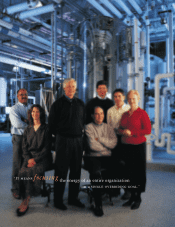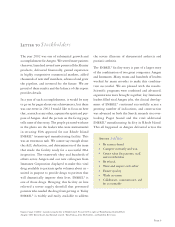Amgen 2002 Annual Report Download - page 17
Download and view the complete annual report
Please find page 17 of the 2002 Amgen annual report below. You can navigate through the pages in the report by either clicking on the pages listed below, or by using the keyword search tool below to find specific information within the annual report.
Page 15
chemotherapy where the anemia is due to the effect of chemotherapy. Aranesp
®
, however,
has a half-life approximately three times longer than Epoetin alfa, offering health care
providers the ability to treat anemia related to chemotherapy with less-frequent dosing than
Epoetin alfa.
Because it requires fewer injections, Aranesp
®
can help patients and their physicians
overcome barriers that may hinder the delivery of anemia treatment, notably the need for
frequent office visits for injections.
As many as 60% of cancer patients worldwide suffer from anemia, either because of the
cancer itself, or as a side effect of chemotherapy. In severe cases, anemia can force doctors to
interrupt chemotherapy regimens. Currently, only one in four anemic cancer patients receive
an erythropoietic agent in the United States.
Neulasta
™
(pegfilgrastim), Amgen’s latest infection-fighting therapeutic, received approval
in 2002 in the United States, Europe, and Australia for reducing the incidence of infection
from chemotherapy-induced neutropenia in cancer patients with nonmyeloid malignancies.
Neutropenia is marked by a severe decline in the number of white blood cells, known as
neutrophils, that play a vital role in fighting most types of infection. With a severe drop in
white blood cells, even a seemingly minor infection can become life-threatening. Up to half
of cancer chemotherapy patients worldwide develop severe neutropenia during the course of
their treatment.
Like NEUPOGEN
®
(Filgrastim), Amgen’s original white blood cell stimulating product,
Neulasta
™
has been shown to decrease the incidence of infection as a result of chemotherapy-
induced neutropenia. But Neulasta
™
is a longer-acting form of Filgrastim, offering greater
freedom for patients and caregivers with its once-per-cycle injection.
In contrast, NEUPOGEN
®
requires daily injections for as many as 14
consecutive days following chemotherapy.
The burden of administering NEUPOGEN
®
daily has led many health
care professionals to wait until after a chemotherapy patient develops
a neutropenic infection to administer Filgrastim in subsequent cycles
of chemotherapy. In fact, less than 10% of these U.S. patients histor-
ically have received proactive protection from neutropenia. Yet many
patients are hospitalized each year for neutropenia and its complica-
tions, in an age when most chemotherapy patients are routinely treated
in an outpatient setting.
Both Aranesp
®
and Neulasta
™
represent significant benefits in the
supportive care available for cancer patients undergoing chemotherapy.
They present health care professionals with the means to simplify
therapeutic delivery, while improving the chances that cancer patients
can complete prescribed cycles of chemotherapy with fewer potentially
debilitating complications. The adoption of these two breakthrough
therapeutics in various health care markets provides strong evidence
of their value.
























